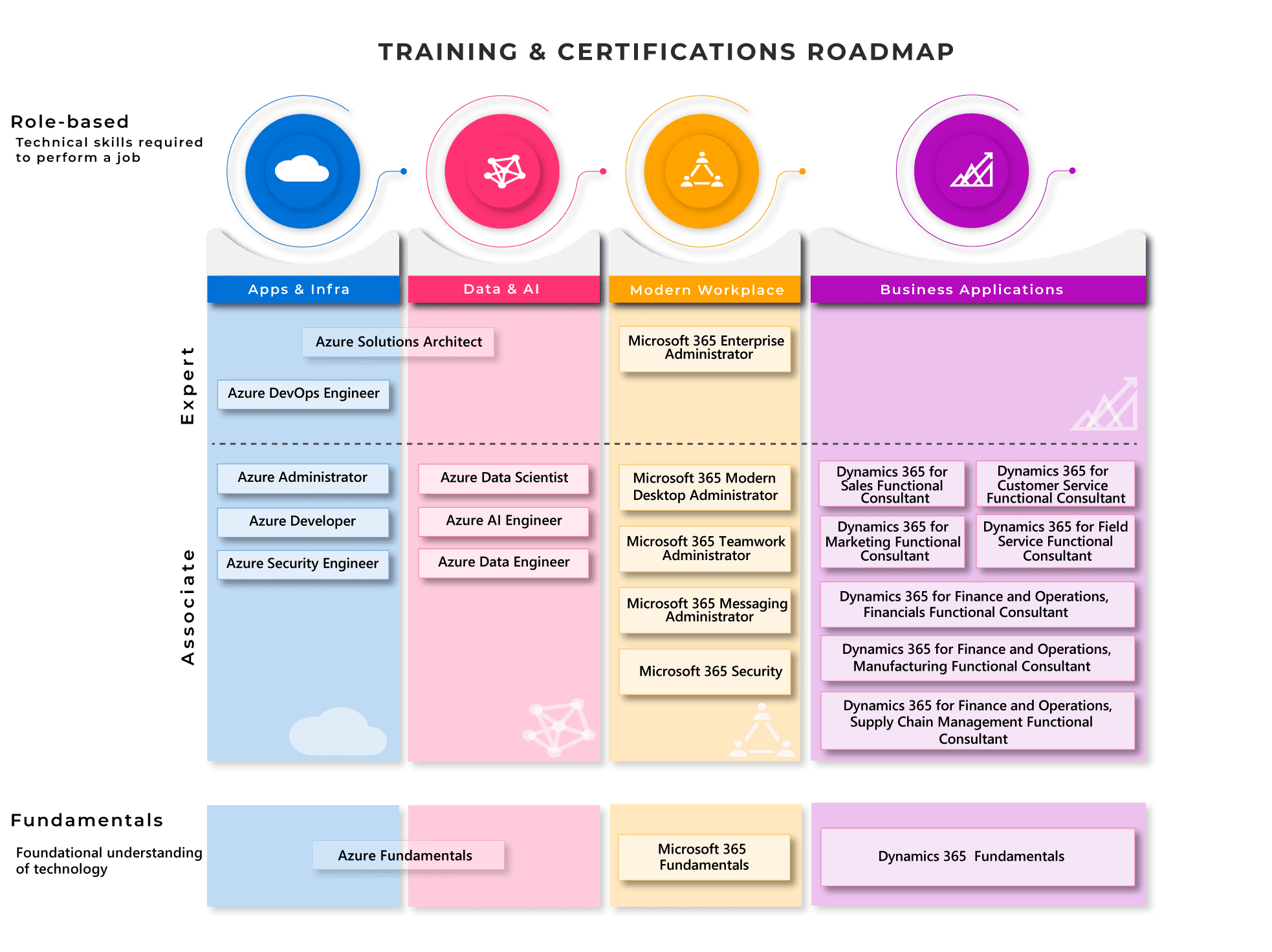Unable to find what you're searching for?
We're here to help you find itChange Vendor
Microsoft Certification Courses Microsoft stands as a pillar in the world of technology, driving innovation and digital transformation across the globe. As a leader in software development, Microsoft's suite of products, including Windows, Office 365, and Azure, are integral to the operations of millions of businesses and the daily lives of countless individuals. In today's fast-paced environment, proficiency in Microsoft technologies is not just an asset; it's a necessity.
Understanding Microsoft's ecosystem allows professionals to harness the full potential of tools like Power BI, Dynamics 365, and SharePoint, ensuring efficient workflow management and data analysis. Learning about Microsoft's offerings is crucial due to their ubiquity in the workplace and the cloud computing revolution led by Azure.
Microsoft professional certification programs provide credentials that are respected across the industry, proving your technical skills. Getting a certification builds your professional reputation and shows employers you are dedicated to keeping your skills up to date. These credentials confirm that you have the ability to handle important technology-focused jobs. At Koenig Solutions, we are experts in Microsoft certification training programs, helping professionals like you earn this global recognition and achieve your career goals.

Change Partner
Clear All
Filter
Clear All
Clear All
Clear All
*Excluding VAT and GST
Showing to of entries


History of Microsoft: A Legacy of Innovation
Microsoft, founded in 1975 by Bill Gates and Paul Allen, has revolutionized the IT landscape with its trailblazing innovations. Starting with the development of BASIC for the Altair 8800, Microsoft swiftly became a household name through the introduction of its Windows operating system in 1985. This GUI-based OS transformed personal computing, making it more accessible to the masses.
Over the years, Microsoft has consistently pushed the boundaries of technology. Its Office Suite became the gold standard for productivity software, while recent ventures into cloud computing with Azure have cemented its place as an industry leader.
Microsoft's commitment to research and development has also led to breakthroughs in areas like artificial intelligence and gaming, with products like the Xbox series captivating millions worldwide. This storied company continues to shape the future, not just through its products, but also through its philanthropic arm, the Bill & Melinda Gates Foundation.
Through its unwavering spirit of innovation, Microsoft has not only shaped IT but also redefined the way we live and work.
Microsoft continues to lead the IT industry with its innovative advancements and cutting-edge technologies. Embracing the cloud-first world, Microsoft has been pivotal in driving the adoption of Azure, its ever-expanding cloud platform. With the rise of remote work, updates to Office 365 and Microsoft Teams have become essential tools for collaboration and productivity. In response to the evolving tech landscape, Microsoft recently launched Azure AI and Azure Quantum, providing a competitive edge in artificial intelligence and quantum computing. The company’s commitment to cybersecurity is evident in its advanced security solutions, ensuring robust protection in an increasingly digital world. Koenig Solutions stays ahead by offering a variety of new courses tailored to these trends. Microsoft Certified: Azure Data Scientist Associate and Microsoft Certified: Security Operations Analyst Associate are just a few examples of the latest certifications designed to equip professionals with the skills needed to thrive in today's dynamic IT environment. Keep pace with technology by joining our expert-led training programs and harness the power of Microsoft's revolutionary advancements.
IT Professionals looking to confirm their skills in infrastructure, cloud, and security.
Software Developers and Engineers who want to become experts in building applications on Microsoft platforms.
Data Scientists, Analysts, and AI Professionals aiming to prove their knowledge in data and artificial intelligence.
Cloud Architects and Administrators who design and manage solutions on Microsoft Azure.
Security Engineers who protect business systems using Microsoft security tools.
Business Professionals and Functional Consultants who use and manage business applications.
Taking Microsoft Certification Courses gives you proven skills that companies are actively looking for. Holding a Microsoft certification can open doors to better job opportunities and help you qualify for more advanced roles. These credentials help you advance in your career by making sure your skills stay current with the latest technology.
Certified professionals are often considered for positions with more responsibility and leadership potential. These programs offer a clear path for improving your skills and moving forward in your career. With many learning paths available, you can find training that fits different job roles, from developers to data analysts. Koenig Solutions offers comprehensive MS certification classes online to support you on your journey to career success.




